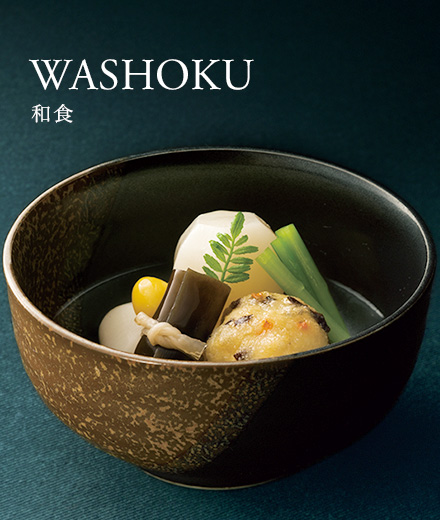-
Traditional food culture developed and cultivated in Japan’s nature and history
Long in the north and south, Japan is occupied by mountains more than 70% of its land and surrounded by ocean.
Blessed by the unique climate and the natural features, Japan has the great food culture that can be proud to the world with a lot of delicious food materials gathered from the mountains, the country (satoyama) and the sea. From cooking technics and cookware suitable for the ingredients to tableware and manners the dishes are served with, homage to nature and unique cultural background nurtured by long history can be found in its base.
“Washoku” is not just one of the cooking methods, but the consolidation of history and locality expressed in dietary habits. -
The most important elements of “washoku” are “ingredients”, “cooking”, “nutrition” and “hospitality”.
Although the food self-sufficiency rate is not so high, Japan has a variety of food materials like rice and other farm products, many kinds of fishes from the rich fisheries ground and also the blessings of nature like animals and plants. Because of its geographical and climatic characteristics, Japan is a rich repository of natural resources. And people in Japan have contrived to make these ingredients even better and more delicious.
-
Cooking methods like “boiling”, “steaming” and “simmering” have been developed with an abundant supply of water found in all over Japan. Cookware and tableware have been reformed and changed as well. Even though food cultures are different locally, the composition of “ichiju-sansai” that has one soup, one main dish and two side dishes with rice as the staple food is shared in common. This idea of “ichiju-sansai” is the basic style of “washoku”.
From the viewpoint of nutrition, the cooking based on “ichiju-sansai” makes the best use of food materials without spoiling nutrients and focuses on well-balanced recipe with less animal lipid and low in calories. The culture of “washoku” is the source that has maintained Japan as the nation of health and longevity.
-
Hospitality is not just a customer service of a particular restaurant but the mind that esteems nature and bonds of people, and manners of provider and customer that shows kindheartedness of both parties. Hospitality is reciprocal consideration after all. A unique mentality of “wabi” and “sabi” which is “to love something frail” can be found in this mutual understanding.
“Washoku” has been established as“culture” by inheriting and maintaining above mentioned four elements that comprise “washoku”.
Along with the diversification of recent dietary habits, the ingredients and the cooking methods have been also changing. “Washoku” adopts foreign ingredients and new methods of cooking and integrates into the modern styled washoku basing on the four elements. In other words, “washoku” is developing new ideas based on study of the past. And this is the most fascinating aspect of “washoku”.
- Before|
- Next

